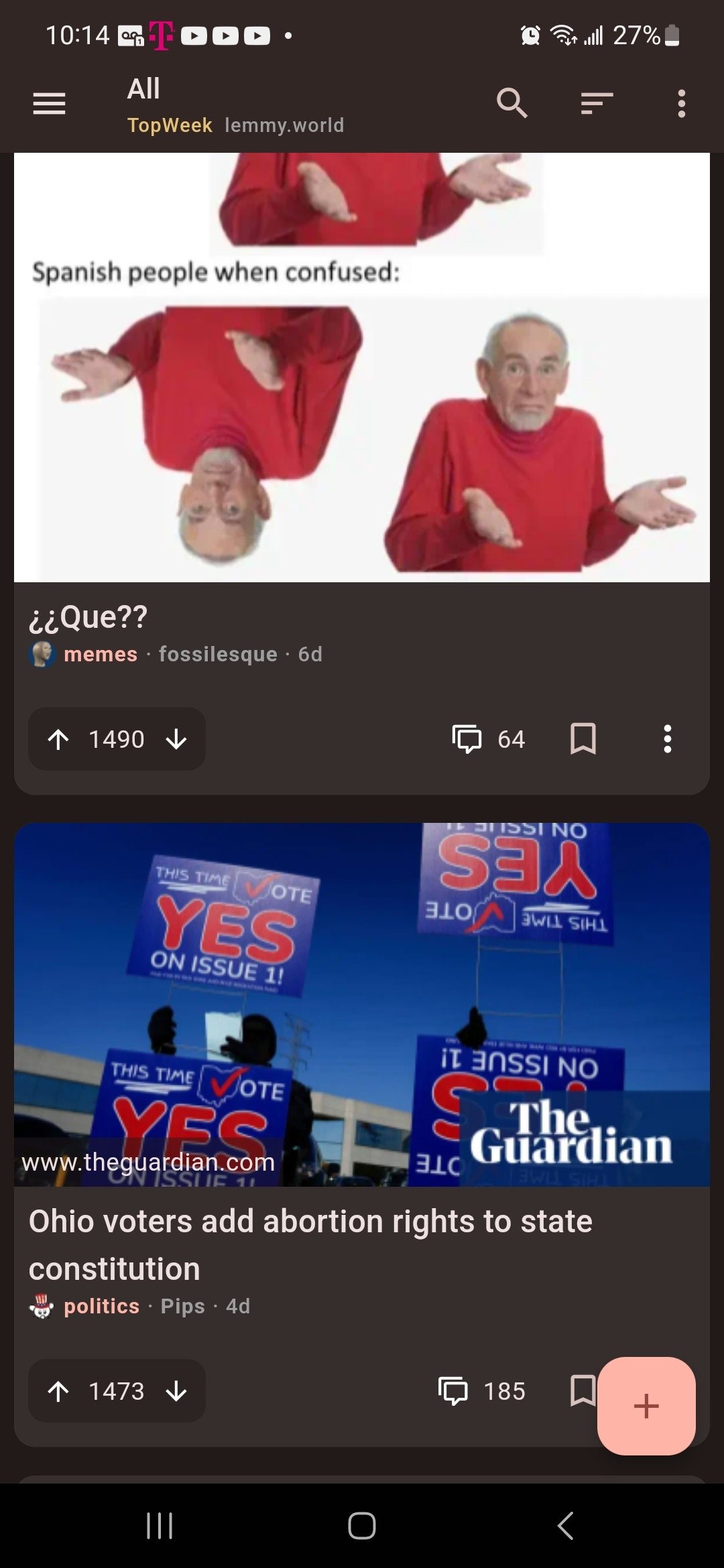So… Spanish people aren’t normal people?
Definitely not. Haven’t you met one before?
Nope.
If someone defied gravity when confused, I’d feel pretty comfortable saying that wasn’t normal, regardless of race.
this is my 🤓 moment, but Spanish isn’t a race…
I know, I’ll take the 🤓
Yeah, I just responded quickly without thinking.
Also, there’s nothing wrong with 🤓 as long as you own it, which you have!
op wasn’t expecting an inquisition.
¿Dónde está la gracia?
El perro está en la biblioteca.
!No corren en el hospital cabrones¡
También no mueran en el hospital, cabrones.
Con amor, una enfermera
To be fair that rule is almost lost, only the autocorrect still adds the initial ?
In informal text perhaps, but in publications and such it’s still used.
Just like how in Dutch the second quotation mark is supposed to be on the bottom. But I don’t even know how to do that on the computer.
The opening quotation marks should be on the bottom, but it’s been a while since I wrote them that way. Luckily, the wiki page (in Dutch) shows how they can be entered in three common OSes (see: unicode), so I’ll try my best to revive the correct usage again.
Also, I don’t think it is considered incorrect to use top quotation marks on a computer any longer.
Also in German. Word autocorrects that for example.
In Slavic languages too
¿sin cinco?
Yeah, I never got the upside-down questionmark as well 😂.
It’s so you can start reading a sentence in the correct intonation
This can’t be right. It’s far too simple and logical. I’m a native English speaker, and I’m used to grammar that’s nonsensical and inconsistent.
In spanish questions intonation changes occur only on the last word(s), not the whole sentence. I’m not a linguistic, but I think it’s so you can be sure a sentence is a question from the start.
When reading english sometimes I assume a sentence is an affirmation until I see the question mark, and then I have to reinterpret the sentence. I wonder how it is for native english speakers. Do they assume nothing until the sentence is finished?
In spanish questions intonation changes occur only on the last word(s), not the whole sentence. I’m not a linguistic, but I think it’s so you can be sure a sentence is a question from the start.
That might be the case in the dialect you’re familiar with, but “¿Me dijiste que no te moleste?” has a different intonation to “Me dijiste que no te moleste.” in my Spanish (starting from “dijiste”).
As for English, questions normally start either with a question word or a (auxiliary) verb, while affirmations normally start with the subject. See “You told me not to bother you.” vs. “Did you tell me not to bother you?”. Using just intonation is possible (“You told me not to bother you?!??”), but when in writing, it’s usually formatted in a way that highlights it because it usually indicates outrage/disbelief.
Interesting. Afaik what determines a question is a higher pitch, so in your sentence I wouldn’t think of the sentence as a question until I hear the intonation of the last word.
Like, toda la oracion puede tener cualquier tono, pero si la última palabra tiene un tono mas agudo (molesteee en vez de moleste) recien cuenta como pregunta.
Me puse a pensar y escuchar conversaciones, fijandome si el tono cambia siempre en la ultima palabra, o en algun otro lado, y en donde vivo (casi) siempre el tono cambia en la ultima palabra, incluso solo la ultima silaba.
Me pregunto si de donde eres toda la oracion (o, desde “dijiste”) el tono es más agudo, o si usan otra forma para diferenciar?
In English most questions stay flat and only raises the pitch on the last syllable, if any. In Spanish we can raise the pitch on the first word and stay flat for the rest of the question. That’s what’s useful about the ¿
Solo me fijé en la ultima palabra, no en la primera. Tal vez nunca me di cuenta que si cambia
You are indeed right, my explanation was poor. But for other languages it is very common to get surprised at the end of sentences, yes.
I think English flags a sentence with word choice more, whereas in Spanish the same words and word order can often be equally valid as a question and as an answer.
Are you cold? vs You are cold.
¿Tienes frío? vs Tienes frío.
I’m struggling to think of an English sentence where it’s ambiguous in the same way. They probably exist but I am struggling to think of an affirmation that doesn’t change the word order like that, other than trivial examples like “Coffee?”
In Spanish questions are phrased the same way as affirmations, when you are speaking the only difference is the intonation. Without a mark to say you are starting to read a question it’s possible that the meaning changes in the end which would be annoying. (Source: Portuguese is the same but has no inverted question mark, and sometimes it’s mighty annoying, especially with long questions)
Portuguese is the same but has no inverted question mark, and sometimes it’s mighty annoying,
¿What if you just used them anyway?
¡Problem solved!Funny enough English does this all the time:
- That’s food.
- That’s food!
- That’s food?
- That’s food?!
- That’s food…
All have different intonations and punctuation but are otherwise the same. Internet lingo does compensate for this somewhat but at least in “proper” form the above holds true for all kinds of situations
English can do that too, but it’s not really a “proper” way of doing it. The proper way would be to say “is that food?”
There are languages where the only way to pose a question is to change the intonation.
But doesn’t the intonation simply go up in the end? So it’s good enough to stumble over the ? in the end.
I honestly haven’t paid attention where it starts going up. But I always thought that doing the two “?”s in Spanish was pretty clever for that reason.
1 Food that is edible
2 Tasty food
3 Bad looking food
4 Either happy or disgusted at what was just in your mouth
5 Defending your cooking after it’s referred to as 1-4
Imagine if you could ask questions like “James, Mary, and Jack went to the market last Saturday to buy a shovel, a black bag, and some gloves, to bury Karen’s corpse in the deep dark woods?”
No no no, James, Mary, and Jack went to the market last Saturday to buy a shovel, a black bag, and some flashlights, to bury Karen’s corpse in the deep dark woods
True, though doing this makes it sound incredulous.
In Spanish it’s just how questions are.
Yeah that’s true for any language really
Not really. In my language subject and verb get switched around in a question. So you immediately know it’s a question when you start reading the sentence.
Can you give me an example?
Edit: Ok thanks guys, I got it :D
Can you give me an example - Question
You can give me an example - Affirmation
I know you already got it but a few others came to my mind:
Finnish, which not a tonal language:
- Sinä pidät kahvista. (“You like coffee.”)
- Pidätkö kahvista? (“You like coffee?”)
Japanese:
- Anata wa kōhī ga sukidesu. (“You like coffee.”)
- Kōhī wa sukidesu ka? (“You like coffee?”)
I think you’ll find the pattern of question words/suffixes in nearly every language that is not explicitly tonal.
Yeah that’s initially why I thought there was no difference to Spanish. But the difference is Spanish actually doesn’t have an option where you switch subject and verb. Didn’t know that :)
Oh. Very good point. I did not know that either.
Maybe
- I do like cats
- Do I like cats?
but taken to the extreme?
-
Hij schreef een bericht. (He wrote a message)
-
Schreef hij een bericht? (Did he wrote a message?)
deleted by creator
Zeg eens, waarom wil je zo graag met een CEO slapen?
Fuck Spez daarom
-
deleted by creator
É de facto irritante. Nada como estar na escola e um prof pede para ler. Estás calmamente a ler o texto e de repente tens de forçar a porcaria da entoação para sobrecompensar o facto de que não reparaste que era uma pergunta
*either
Grammar nazi out.
Yes, that would be better 👍.
I like the prefix marks. I wish we used them for all of our punctuation. They improve readability. Imagine if we removed the leading double-quote on our quoted lines.
.I feel like this analogy doesn’t entirely work because you always know where the question starts, as that’s where the sentence startS. ,And a sentence always starts where the one before ends, ¿righT? .However I still see why you say it improves readabilitY. ¡I’m sure my comment is very readable right noW!
.I feel like this analogy doesn’t entirely work because you always know where the question starts, as that’s where the sentence startS.
Not always. For example (translated):
And you, ¿how are you?
You could write that as “And you? How are you?” so both parts of that sentence are still a question.
However there are other examples where you’re right: “,That’s not going to happen, ¿or is it?”
I feel like the first example in your comment implies a different intonation than it’s equivalent in PooloverNathan’s comment. Also I feel the need to admit that I first read ¿)Nathan’s(? username as “Pool-over” as in “pull over”…
Ngl in my head I read this as “I. . . feel like”
I don’t mind the prefixed punctuation at all and don’t think it hurts readability in the slightest.
Your inexplicable decision to capitalize the final letters is awful though, and definitely makes it less readable.
lol noted, I was just goofing around
lol yeah I guess it depends on the length of the sentence and the context. Context is usually pretty clear for questions, and maybe exclamations are typically short enough that the ‘!’ is already visible anyways. Definitely wasn’t considering periods and commas in that list.
100%
deleted by creator
Statement: Perhaps HK-47’s programmers had the right idea.
Thoughtful: The Elcor’s manner of speech from Mass Effect would be particularly useful when communicating through text as well.
Approving: Indeed
Sarcastic: Indeed.
Wow. So that’s how you can actually do sarcasm on the interwebs!

🙃 me gusta ☺️
deleted by creator
¿cómo?
















